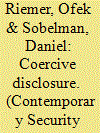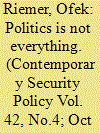| Srl | Item |
| 1 |
ID:
189936


|
|
|
|
|
| Summary/Abstract |
Can intelligence serve as a coercive instrument in international relations? While coercion literature mostly addresses military and economic means, this article argues that coercion can also include the deliberate public disclosure of intelligence. Intelligence can be employed to threaten adversaries, reduce their latitude, and force them to adjust their plans and operations. Additionally, intelligence disclosure can be used to mobilize domestic and international audiences and make others align with a certain narrative and alter their policies accordingly. Still, coercive disclosure can fail or succeed only partially against a determined opponent or a target that is resilient to public and international pressure. To demonstrate the workings of coercive disclosure, we analyze Israel's campaign, beginning in 2017, against the Lebanese Hezbollah’s missile manufacturing program and Turkey's coercive campaign vis-à-vis Saudi Arabia and the United States following Jamal Khashoggi's assassination in 2018.
|
|
|
|
|
|
|
|
|
|
|
|
|
|
|
|
| 2 |
ID:
181664


|
|
|
|
|
| Summary/Abstract |
Why do states deliberately disclose hard-earned intelligence? For political and operational reasons, Official Public Intelligence Disclosure (OPID) is often considered counterintuitive and ill-advised. However, as this practice proliferates in international affairs in recent years, extant scholarship emphasizes domestic political incentives for its employment. Drawing on interviews with policy, defense, and media figures in Israel, this article generates alternative perspectives. First, in keeping with the dictates of contemporary information and media environment, states engage in OPID as a performative act designed to enhance diplomacy and shape international agenda. Second, in the age of limited wars, instead of being amassed purely for large-scale escalation, selective disclosure of intelligence can be weaponized against adversaries whose operations and very survival depend on secrecy, so as to shape their behavior below the threshold of war. The article advances our understanding of the innovative ways in which intelligence can be strategically employed in the information age.
|
|
|
|
|
|
|
|
|
|
|
|
|
|
|
|